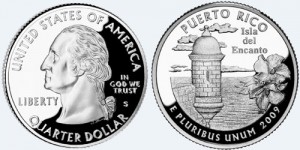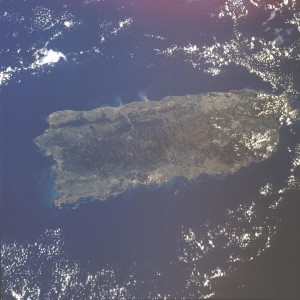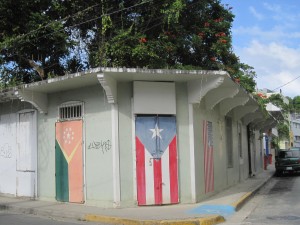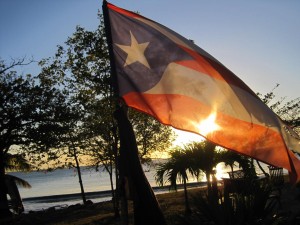Puerto Rico is an interesting place for many reasons. It is part of the United States. Anyone born in Puerto Rico is an American citizen. The U.S. dollar is used as currency. There are no customs or declarations or even passport required to travel from and to Puerto Rico from or to anywhere else in the U.S. as an American. However, Puerto Rico is technically not a state. It is a territory or commonwealth or in Spanish an “estado libre asociado” which is translated as a “free associated state.” It sets Puerto Rico into a sort of limbo status between an American state and some other country. Puerto Rico is not the only one with this transitional sort of status. Others include Guam, Northern Marianas, American Samoa and our neighbor the U.S. Virgin Islands along with quite a few sparsely or non-inhabited territories all across the globe.
Perhaps it is this limbo status that makes everything get just a little more complicated when it comes to identity (and definitely more confusing). Puerto Rico has its own “nation” team at the Olympics and competes as a country in beauty pageants and other world-wide events. As a resident of Puerto Rico, one can vote in the primary elections for President of the United States of America, but not in the actual elections and there is a non-voting representative in congress. Spanish is the preferred and most often used language, but English is also considered an official language. And in culture, Puerto Rico is an interesting mix of Latin American, Caribbean and U.S. customs. With the long history of colonization (from Columbus to the United States of America) it also makes it a touchy subject.

Puerto Rican money is United States money
All of this is to say that Puerto Rico is very unique when it comes to identity. And it makes it difficult to know how to refer to oneself, especially if you are a new resident of Puerto Rico who has come from a state in the United States of America.
For instance, you may use the term mainlander.
Mainlander: someone from the mainland. What does that mean? That you come from the main or major land? What is the mainland? The continental, contiguous 48 states? Yes, that would describe us, considering we came from Colorado which is practically smack dab in the middle of the country. However, some may say that it also subconsciously delegates Puerto Rico, (or Hawaii or Alaska for that matter) as lesser, inferior and not as important (main), so I do not like this term.
Continental: From the continent. Not only does this make me think of breakfast (ha!) but which continent? Puerto Rico is still in the North American continent right?
Or how about American?
American: someone from America. What America are you referring to? North America? Central America? South America? Latin America? The United States of America? Puerto Rico also belongs under America, and so it does not fit to use this word when distinguishing between Puerto Ricans and people from the states since they too are Americans. Although, in Spanish, “Americano” is the term I hear the most when Puerto Ricans refer to people like us.
United Statesean? Someone from the United States.
Not only does that sound awfully awkward, but even this would still refer to Puerto Rico even though it is not a “state.” In Spanish it sounds a little better “estadounidense” but not much. And to further confuse things, the United States of America is not the only “United States.” Mexico’s official country name is Los Estados Unidos Mexicanos which translates to the United States of Mexico or United Mexican States. So…technically a Mexican person is a United Statesean!
Gringo?
Gringo/gringa is a slang term. Sometimes it is used jokingly, and sometimes it is used derogatorily. It also comes bundled with skin color in addition to geography. So an African American would not generally fit the “gringo” label. It is probably the easiest way to describe someone who moves from the states, especially someone who doesn’t speak much or any Spanish, but it is probably not the most technical or PC. This term was borrowed from Mexico and now is used extensively -and absentmindedly.
Güero:
I don’t hear this one in Puerto Rico, but I heard it (güera) a lot in Mexico. It specifically refers to a blond or light skinned person. In Puerto Rico, the skin color variations don’t seem to carry as much of a cultural weight as they did in Mexico.
Anglo: As in Anglo-Saxon, from English background. This is a race designation much like White. It does not reflect the geographical and cultural differences though there is a lot tied to this word as well. It is also a pretty outdated word, like Caucasian, and to be honest most people nowadays don’t use it. It does cover some of these differences, though in modern discussions of race it would be “White, non-Hispanic” because White is considered a race and Hispanic is an ethnic designation. And while this could describe me, it obviously would not refer to all people from the states of different races, and ethnic groups including other Hispanic populations, who move to Puerto Rico.
Ex-pat: Expatriate. While moving to Puerto Rico in many ways may feel like moving to another country, unless someone has moved from another country other than USA to Puerto Rico, this term does not technically apply and really shouldn’t be used to describe people who move from the states here.
So…what do I do?
Sometimes I may use one of the above terms, but I generally say “from the states” or “stateside” since Puerto Rico is technically not a state, I feel that that is safe. Gringo is probably the most common one that most people use in English and sometimes in Spanish. In Spanish, Americano seems to be the most used term.
I hear most Puerto Ricans call themselves Puerto Rican (Puertorriqueño) or Boricua which is the ancient Taino word for the inhabitants of this island as it was once known: Borinquen. So in reference to people from here I use these terms or I may also say “from the island” (de la isla) even though Puerto Rico is technically more than one island (see what I mean by complicated!?).
And the final question: Am I now Puerto Rican?
Now that we are full-time residents of Puerto Rico, am I Puerto Rican? Though it is common to say, I have begun to feel a little uncomfortable using “Puerto Rican” as a term that excludes myself now because I am a resident of Puerto Rico. By living here I now have more in common with people in Puerto Rico than people elsewhere and so I do not want to feel an “us vs them” mentality. I am, after all, a Puerto Rican if the definition is that I live in Puerto Rico! This is now home! But I know that for many reasons there will probably always be a distinction between me and the Puerto Ricans who have been born and raised on these islands or even those whose families are from here. Just as I will always have my own ties to Colorado.
And so after all of this, I am still just not exactly sure what the best way to identify myself and others like me that is accurate, sensitive and easy. Any thoughts?
So we will continue to live in Puerto Rico with questions of identity (or at least semantics). Perhaps our own search for identity here is a reflection of the island itself as a land in search of an identity- a clear place and description in the world. Sometimes defined as a country, a nation, a territory, a commonwealth, a state, an island chain, but always, just like all of us, looking for both our unique individuality and a place to belong.




Nicely laid out. Of course, it’s all semantics, but my reaction is that this ambiguity is one of many things that make Puerto Rico so interesting and compelling.
Cassie you are confusing the word gringo with the word hunky. Ive have heard that word more on white hippies surfers than the puertoricans . That gringo word is like the word hoosier in the state of Indiana .I compare Puerto Rico with Hong Kong the only difference is that Puerto Rico has fought all American Wars from World War 1 to war on terror on this date for a president that cannot vote and Hong Kong never fought for England when they were part of thhe british kingdom,Over the years puertorricans have kept their own identity regarding american colonialism try wipe Puerto Rico culture and language.That is what makes different like Hispanics in USA that are different numeric white baby boomers that expect and want any newcomer to change everything from you are
‘De la isla’ only refers to people living outside of the metro area, it used somewhat pejoratively because many people in the San Juan area say that the rest of the island is inhabited by jibaros and indios. For example, if someone from Cabo Rojo goes to SJ, they will be told ‘aja, eres de la isla’………….
I think you can describe yourself by whatever term makes you comfortable. Others will describe you using any of the above terms, depending on how they see you or who they are and/or who they are talking to. If anyone refers to you guys as Puerto Rican, they are trying to flatter (or offend???) you, because being Puerto Rican is much more than being a resident, even if you do live like Puerto Rican campesinos. Which of course is wonderful, since a very large majority of Puerto Ricans here don’t have a bunch of fruit trees or chickens! I was a resident of California for more than 10 years before I referred to myself as a Californian. Thirty years later, I move back to my native PR and am often called “americana”! Yes there is a huge identity crisis here, both individually and collectively. EG, where else are the speed limit signs in miles per hour, but the distances between towns shown in kilometers?! Weights are usually in pounds, but gasoline is sold by the liter! And the language… so many English words spoken as if they were in Spanish with a Spanish pronunciation….. that’s another story you’ll have to write about! — Fran
Kevin,
I hadn’t ever heard that about “de la isla.” Thanks for letting me know!
Fran,
I think you’re right: calling yourself from a certain place does take time. And I think you’re also spot on that most locals would laugh if I were to call myself Puerto Rican at this point…but I also don’t like the separation I feel when I hear things like “Puerto Ricans” this and “Gringos” that. I mean, we all live here together and share this place in common. Of course, even in Colorado I remember it would take a while to fully accept someone (usually from California strangely enough) as well so maybe this is a fairly prevalent occurrence anywhere.
Hi Cassie,
Nice summary. I think you become Puerto Rican when you embrace and begin to live by the many idiosyncrasies that exist in PR culture. Drive slow in the left lane, ask your grandparents for gods blessings (benedicion), enjoy eating Bacalao, mix Spanish and English in the same sentence,speak to everyone no matter where you are, live on PR time, etc. Seems like you’re on the path…so my guess is with some time you will be PR in your heart and you will know it.
Cuco
Hi Cassie,
I’ve recently started to read your blog and enjoy reading about your experience here on the island. As a puertorican that looks a little bit “gringo” I think you’re spot on on most of your identity distinctions. I really wanted to add that being puertorican for me is not about where you were born or about how you look, but about how you feel for this island. And about that, I can tell that you love this place more than many people that are technically “puertoricans”. To me, that makes you a puertorican already and I’m glad that there are puertoricans like you.
Best Wishes,
PD: I always like to give the example of a man called Tony Croatto. He was know as a incredibly proud puertorican singer, and I believe he was a role model for the rest of us. He was actually born on Italy and came to PR in his 20s and till the day he died he and all of us considered him a true puertorican.
Brian
Thanks David and Brian,
That is interesting about Tony Croatto. Sort of like John Denver in Colorado who while born in New Mexico is basically a symbol of Colorado now…even changed his given last name to the state’s capital. Sometimes love for a place isn’t solely tied to where we were born 🙂
Okay….a each day I work my farm here in Puerto Rico. When I stop by the local bar for a cooling beverage folks are curious as to what I am doing. I get all excited about the farm and what I am planting and my plans…Some mention that I am more Boricua than they. MayBe Boricua could apply to someone who incorporates life similar to the Tainos. Just a thought.